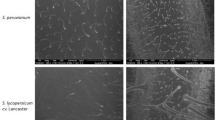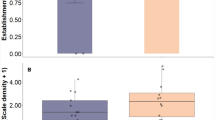Abstract
It has been proposed that host castration is a parasite strategy to reallocate host resources from reproductive to vegetative functions to increase parasite fitness. Since resource partitioning between reproduction and vegetative growth can affect host life-history traits, parasite effects on resource allocation can affect both plant fitness and host-parasite coevolution. Field and greenhouse experiments were used to investigate the effects of host castration by the fungus Atkinsonella hypoxylon on the resource allocation and architecture of the grass Danthonia spicata. The results indicate that non-infected D. spicata can reallocate resources from reproduction to vegetative growth when resource allocation to reproduction is prevented. However, I found no evidence that fungal castration causes reallocation of resources from host reproduction to vegetative growth. Instead, infection reduces host biomass and the fungus directly utilizes resources that would have been used for host reproduction for its own reproduction.
Similar content being viewed by others
Author information
Authors and Affiliations
Additional information
Received: 25 March 1999 / Accepted: 24 October 1999
Rights and permissions
About this article
Cite this article
Kover, P. Effects of parasitic castration on plant resource allocation. Oecologia 123, 48–56 (2000). https://doi.org/10.1007/s004420050988
Issue Date:
DOI: https://doi.org/10.1007/s004420050988




